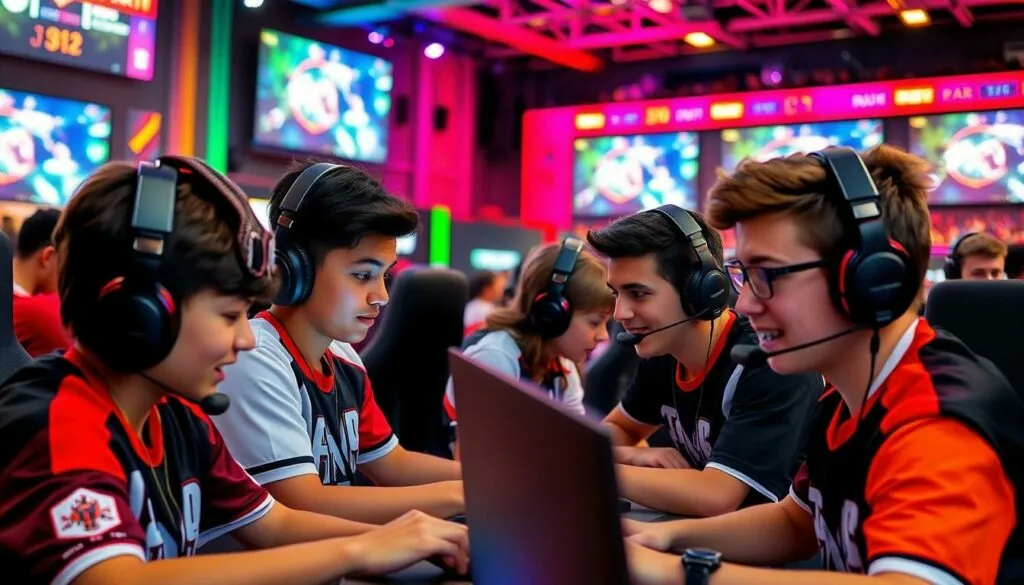Table of Contents
TogglePicture this: athletes in sleek tracksuits, the Olympic flame burning bright, and then—bam!—a gamer in a hoodie takes the stage, fingers flying across the keyboard. Esports has exploded in popularity, captivating millions worldwide. But the question remains: should it join the ranks of traditional sports in the Olympics?
Overview of Esports
Esports represents a rapidly expanding segment of the entertainment industry, with millions of participants and viewers worldwide. Competitive gaming includes a variety of genres, such as first-person shooters, multiplayer online battle arenas, and real-time strategy games. Popular titles like “League of Legends,” “Dota 2,” and “Counter-Strike: Global Offensive” attract large audiences and serve as focal points for competitive tournaments.
Several large events and leagues, like the Overwatch League and the International, showcase top-tier talent and offer substantial prize pools, often exceeding millions of dollars. Institutions and organizations increasingly recognize esports, with many colleges and universities establishing dedicated esports programs and scholarships.
Player skill and teamwork define success in esports, much like traditional sports. The physical and mental demands of gaming require training regimens that resemble those of athletes competing in sports like basketball or soccer. Coaches and analysts support teams, developing strategies and improving performance.
The strong global community of esports enthusiasts spans diverse demographics, with viewers tuning in from various countries. Platforms like Twitch and YouTube Gaming facilitate the live streaming of competitive matches, creating an interactive experience for fans.
Debates about esports’ legitimacy arise in discussions about whether it should be considered a sport. Critics point to the absence of physical activity, while supporters emphasize the skill, strategy, and dedication involved. Various international sporting organizations evaluate the impact of esports, prompting questions about potential inclusion in the Olympics.
History of Esports in Competitive Gaming
Esports has evolved significantly since its inception. Early competitions laid the groundwork for today’s expansive scene.
Early Beginnings
Arcade gaming in the 1970s introduced the concept of competitive play. Titles like “Pong” and “Space Invaders” attracted players seeking high scores. Tournaments emerged in the 1980s, notably the 1980 “Space Invaders Championship,” where participants faced off for the top position. During this period, fandom grew around competition-based gaming. The establishment of online platforms in the 1990s revolutionized accessibility for players and spectators alike. The release of “Doom” and “Quake” introduced first-person shooters, inviting more gamers to compete. This foundation set the stage for future developments in the esports landscape.
Growth of Esports Tournaments
The early 2000s marked a turning point with the advent of dedicated esports tournaments. Events like “World Cyber Games” and “Electronic Sports World Cup” attracted international attention. Prize pools expanded dramatically, with top tournaments offering payouts of $1 million or more. The rise of streaming platforms in the 2010s further fueled growth. Gamers could showcase their skills to massive audiences via Twitch and YouTube. Major titles like “League of Legends” and “Dota 2” helped establish a new era of professional gaming. These tournaments not only highlighted player talent but also engaged millions of fans and followers, solidifying esports as a significant force in competitive gaming.
The Olympic Movement
The Olympic Movement continually evolves to reflect contemporary culture and interests. Over the years, the Games have incorporated various sports, adapting to societal changes.
The Evolution of the Olympics
The Olympics began in ancient Greece, showcasing physical competition among athletes. Modern revival in 1896 introduced sports like athletics and gymnastics. Since then, the Olympic program has expanded significantly, including sports such as basketball and skateboarding, addressing a broader audience. The addition of events illustrates an effort to stay relevant and exciting. Recent Games have seen the introduction of new disciplines like surfing and sport climbing, aiming to attract younger viewers.
Inclusion of New Sports
New sports often undergo rigorous evaluation before inclusion in the Olympics. Criteria include the sport’s global popularity and governance by international organizations. Esports, in particular, presents a unique challenge due to its digital nature. Discussions around its legitimacy emphasize skill and strategy, paralleling traditional sports. The International Olympic Committee is open to exploring new formats, potentially paving the way for esports. Inclusion in the Olympics could bolster esports’ recognition and legitimacy among traditional sports.
Arguments For Inclusion of Esports
Various factors support the inclusion of esports in the Olympics. One significant aspect involves the legitimacy of esports as a sport.
Legitimacy as a Sport
Esports involves high levels of skill, strategy, and teamwork. Success in competitive gaming hinges on rapid reflexes and critical thinking. Coaches and analysts help build strategies, mirroring the coaching structure in traditional sports. Many players spend hours practicing, just like athletes in basketball or soccer. Some international organizations have embraced esports, indicating a shift toward broader recognition. Events with massive prize pools showcase talent and dedication. This points to a growing acceptance of competitive gaming as an established sport.
Youth Engagement and Popularity
Youth engagement is another compelling reason for esports’ inclusion. Competitive gaming attracts millions of young participants and viewers globally. The rise of streaming platforms like Twitch fosters a vibrant community where fans interact with players. University programs and scholarships for esports provide additional legitimacy, encouraging participation. Tournaments draw significant live audiences, rivaling traditional sports events. Major titles like “League of Legends” and “Dota 2” consistently attract millions of viewers. These factors illustrate that esports resonates with the younger demographic, ultimately supporting its case for inclusion in the Olympics.
Arguments Against Inclusion of Esports
Critics present several arguments against the inclusion of esports in the Olympics, focusing on the differences between traditional and modern sports.
Traditional vs. Modern Sports Debate
Traditional sports require physical exertion while esports primarily involve mental skill and strategy. Many argue that the essence of the Olympics lies in physical challenges, expressed through sports that showcase athleticism. Competitive gaming does not fit neatly within this framework, leading some to question its legitimacy. The Olympic Movement emphasizes the celebration of human physical potential, which contrasts sharply with the sedentary nature of gaming. Moreover, critics imply that including esports might dilute the value of established Olympic sports.
Health and Fitness Concerns
Health and fitness concerns form a significant part of the argument against esports in the Olympics. Sedentary lifestyles have been linked to numerous health issues, including obesity and cardiovascular diseases. Critics highlight that esports requires minimal physical activity, unlike traditional sports that promote fitness. The Olympic platform should prioritize activities that encourage physical well-being, fueling this debate. Additionally, exposure to screens for extended periods raises questions about long-term health implications for players, reinforcing the argument against inclusion. The potential for esports to misrepresent fitness ideals remains a primary concern for many stakeholders in traditional sports.
Current Status of Esports in the Olympics
Esports continues gaining attention in discussions regarding its potential inclusion in the Olympics. Recent developments indicate a growing recognition of competitive gaming by both the International Olympic Committee (IOC) and various national organizations. In 2021, the IOC hosted an Olympic Virtual Series, showcasing games like “Gran Turismo” and “Just Dance,” signaling a shift towards embracing digital competitions.
Recent Developments
Countries increasingly support esports as a legitimate sport. Numerous national federations have formed to govern competitive gaming, enhancing its structure and legitimacy. The Asian Electronic Sports Federation has organized events, aiming for inclusion in the Asian Games. Reports from the IOC suggest ongoing evaluations of esports’ viability for the Olympics, considering factors like global participation and audience engagement. Furthermore, top esports tournaments attract hundreds of thousands of viewers, adding to their appeal.
Future Prospects
Prospects for esports in the Olympics remain promising. The IOC’s openness to new formats indicates an evolving definition of sports. Organizers continue forging relationships with gaming companies, facilitating opportunities to showcase esports during future Olympic events. Engagement from younger demographics enhances its relevancy among traditional sports. Global recognition of esports may shift perceptions, reinforcing arguments for Olympic inclusion. An increase in governing bodies and structured competitions further solidifies its position in international sports.
Conclusion
Esports stands at a pivotal moment in its journey toward potential Olympic inclusion. As the gaming community grows and garners attention from traditional sports organizations the dialogue surrounding its legitimacy continues to evolve. With major tournaments and a dedicated fan base esports has proven its capacity to engage millions worldwide.
The International Olympic Committee’s willingness to explore new formats signals a significant shift in recognizing competitive gaming as a legitimate sport. While challenges remain the increasing structure and governance within esports suggest a promising future. As the landscape of sports continues to change esports may very well find its place on the Olympic stage, captivating a new generation of athletes and fans alike.








